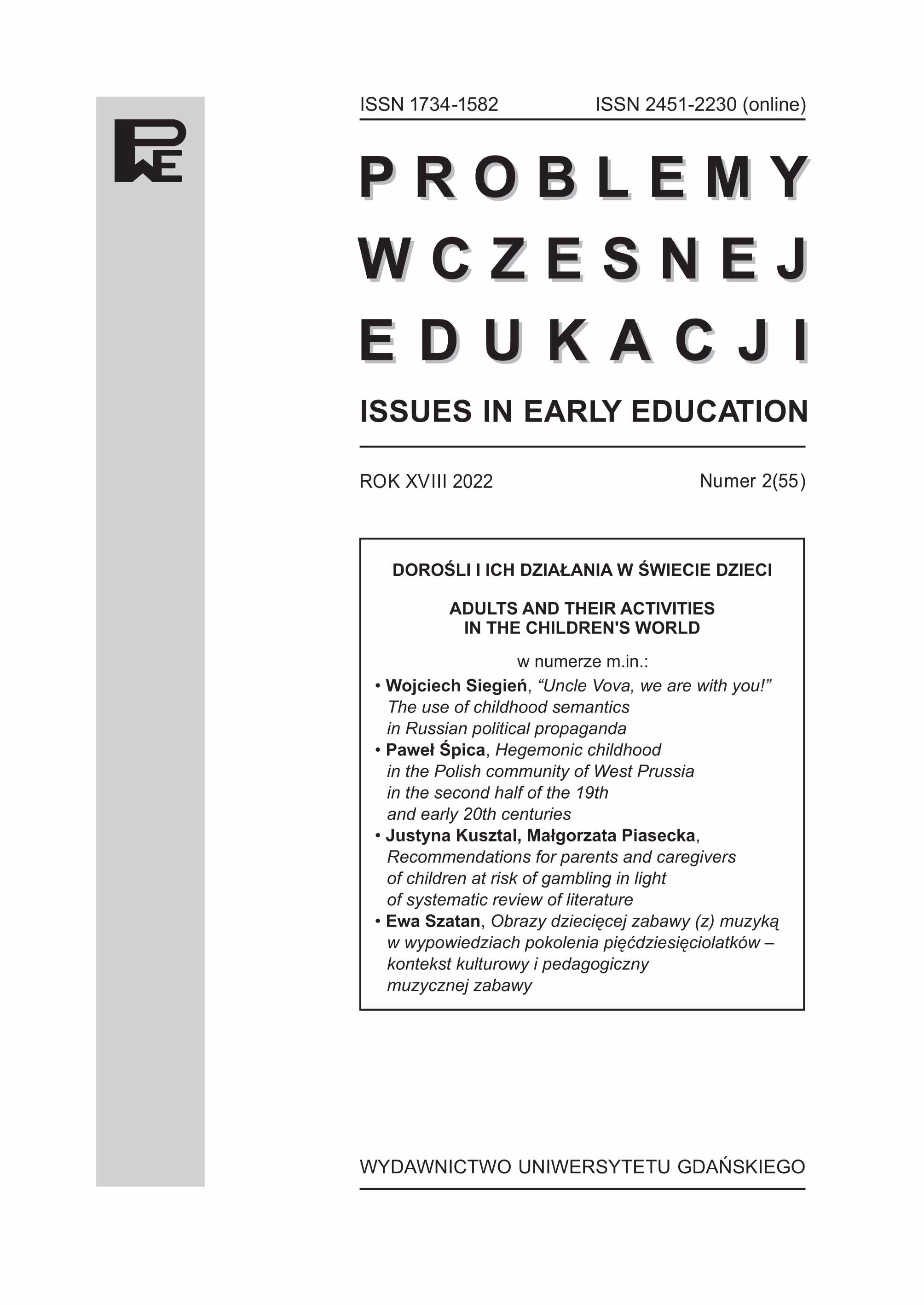“Uncle Vova, we are with you!” The use of childhood semantics in Russian political propaganda
DOI:
https://doi.org/10.26881/pwe.2022.55.01Słowa kluczowe:
wojna, Rosja, dzieci, propaganda, militaryzacjaAbstrakt
The presented article focuses on the analysis of the semantic field of childhood in the propaganda of Soviet and modern Russia. Using a semantic analysis inspired by the works of A. Wierzbicka and J. Lakoff, the author analyses the historical semantic sources of propaganda and the use of the category of childhood in them. An example of an analysed propaganda product is the song “Uncle Vova, we are with you!” published online in 2017. The analysis proves that the semantics of the Russian propaganda message is based on patterns from previous eras with an invariant element – World War II, which is a kind of myth about the beginning of the Russian world. The war in Ukraine today additionally updates the meanings related to the armed conflict and patriotism. The analysis shows that childhood implies patriotism that invokes military meanings and is deeply immersed in the historical context of the war.
Downloads
Bibliografia
Aron R. (1995), Pokój i wojna między narodami. Warszawa, Centrum im. Adama Smitha.
Bogdanov K.A. (2008), Volodia Uljanov. Samyi chelovechnyj chelovek. W: Bonnell V.E. (1997), Iconography of Power: Soviet Political Posters Under Lenin and Stalin. Berkley, University of California Press.
Castoriadis C. (1985), W obliczu wojny. Londyn, Aneks.
Clausewitz von C. (2010), O wojnie. Warszawa, Bellona.
Cloudry N., Hepp A. (2016), The Mediated Construction of Reality. Cambridge–Malden, Polity.
Fabiszak M. (2007), A Conceptual Metaphor approach to war discourse and its implications. Poznań, Wydawnictwo Uniwersytetu im. Adama Mickiewicza.
Flerina E. (1930), Iz opyta issledovatelskoi raboty po detskoi knige. Moskva, MPGU.
Fukuyama F. (1993), The Modernizing Imperative: The USSR as an Ordinary Country. “The National Interest”, 31.
Goddard C. (2011), Semantic Analysis. A Practical Introduction. New York, Oxford University Press.
Grad P. (2021), Podobieństwo rodzinne a paradoks reguły. “Przegląd Filozoficzny – Nowa Seria”, 1(117).
Hassner P. (1998), Filozofia wojny i pokoju w perspektywie historycznej. “Res Publica Nowa”, 2–3(113–114).
Kukulin I., Lipovetskii M., Maiofis M. (sost. i red.) (2008), Veselye chelovechki. Kulturnye geroi sovetskogo detstva. Moskva, NLO.
Lakoff G. (2012), Metaphor and War: The Metaphor System Used to Justify War in the Gulf. “Cognitive Semiotics”, 4(2).
Lin L. (1924), Lenin i deti. Moskva, Molodaia Gvardia.
Majakovskij V. (1925), Vladimir Ilich Lenin. Rossijskoi kommunisticheskoi partii posvjashchaju. Leningrad, Gosudarstvennoe Izdatelstvo.
M.D. (1948), Curiosities of Soviet Propaganda. “The World Today”, 4(9).
Mrugalski M. (2020), Styl – semantyka – pragmatyka. W: D. Ulicka (red.), Wiek teorii. Sto lat nowoczesnego literaturoznawstwa polskiego. Warszawa, Instytut Badań Literackich.
Oushakine A.S. (2019), Realism with Gaze-Appeal: Lenin, Children, and Photomontage. “Jahrbücher Für Geschichte Osteuropas”, 67(1).
Parakhonśkij B., Javorśka H. (2019), Ontolohija vijny i miru. Bezpeka, stratehija, smysl. Kyiv, Nacjonalyj Instytut Stratehichnykh Doslidzheń.
Rank O. (1971), The Double. A Psychoanalitic Study. Chapel Hill, The University of North Carolina Press.
Ulyanova A.I. (1950), Detskie i shkolnye gody Ilicha. Moskwa–Leningrad, Gosudarstvennoe izdatelstvodetskoi literatury Narkomprosa RSFCR.
Wierzbicka A. (2007), Słowa klucze. Różne języki, różne kultury. Warszawa, Wydawnictwo Uniwersytetu Warszawskiego.
Wojtkowski Ł. (2017), The Present Tense of Mediatization Studies. “Mediatization Studies”, 1.
Internet sources
Заседание дискуссионного клуба “Валдай”, http://kremlin.ru/events/president/news/58848, 10.06.2022.
“Дядя Вова, мыстобой”, https://www.youtube.com/watch?v=rE0MrvC0FTE, 20.06.2022.
Анна Кувычко – “Дядя Вова, мыстобой”, https://www.youtube.com/watch?v=3ZZJJ1k8xAE, 20.06.2022.

 Uniwersyteckie Czasopisma Naukowe
Uniwersyteckie Czasopisma Naukowe





